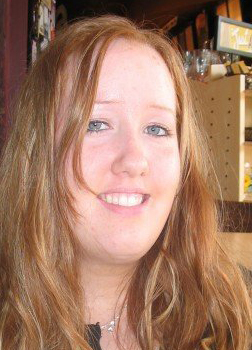AccessSTEM News April 2011
About AccessSTEM
Led by the DO-IT (Disabilities, Opportunities, Internetworking, and Technology) Center at the University of Washington-Seattle, AccessStem is supported by the National Science Foundation (grant #HRD-0227995 and HRD-0833504). Any opinions, findings, and conclusions or recommendations expressed in this material are those of the authors and do not necessarily reflect the views of the National Science Foundation. For further information, to be placed on the mailing list, to request materials in an alternate format, or to donate funds to AccessStem contact:
University of Washington
Box 354842
Seattle, WA 98195-4842
doit@uw.edu
www.washington.edu/doit/programs/accessstem/overview
206-221-4171 (Fax)
206-685-DOIT (3648) (Voice/TTY)
888-972-DOIT (3648) (Toll free voice/TTY)
509-328-9331 (voice/TTY) Spokane
Dr. Sheryl Burgstahler, Principal Investigator
Engage in AccessSTEM
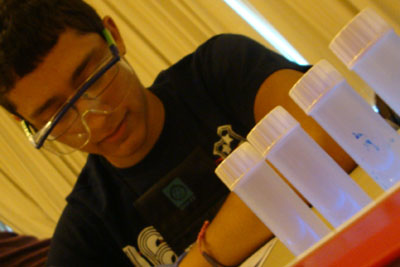
Students with Disabilities:
- Internships
- E-mentoring
- AccessSTEM Team membership
- Summer programs, transition events
Educators & Employers:
- Host an intern
- Communities of practice
- E-mentoring
doit@uw.edu
www.washington.edu/doit/programs/accessstem/overview
AccessSTEM, Collaborating for Impact
The AccessSTEM project is led by the DO-IT Center at the University of Washington (UW) with the goal of increasing the successful participation of students with disabilities in learning opportunities and careers in science, technology, engineering, and mathematics (STEM). Participants learn about STEM career fields, assistive technology, accommodations for employment, transition to work, and cutting-edge research. They also build networks of professional contacts through engagements with corporate partners. For example, recent AccessSTEM activities co-sponsored by Microsoft include the following:
- An event, attended by 200 business leaders and held at the Microsoft Conference Center, recognized Washington State businesses that excel in hiring and promoting individuals with disabilities. The program promoted increased efforts in employing qualified people with disabilities, especially in STEM fields
- A day at Microsoft for AccessSTEM Team student members included a panel discussion with Microsoft employees who have disabilities, a tour of the technology museum, and a session on the accessibility features in Microsoft's products. The students also completed a robot design project in collaboration with mentors
- AccessSTEM Team students met with twenty mentors from Microsoft. The high school and college students met individually with mentors to talk about careers, work challenges, accommodations, resumes, internships, and applying for jobs in high-tech fields
- An accessibility training session for staff from Seattle Public Schools was led by the Microsoft accessibility team. Participants learned about accessibility features built into computer operating systems already owned by the schools, giving insight into how this technology could be accessed by students with disabilities. One participant reported, "I wanted to let you know how valuable the information was… You [Microsoft accessibility team] did a wonderful job of explaining and demonstrating software programs.... We hope to return for more."
Pacific Rim Collaborations
AccessSTEM and other evidence-based DO-IT interventions are being employed around the world. Japan began its collaboration with DO-IT when, in 2004, they sent their first of two professors from the University of Tokyo to the DO-IT Center in Seattle to begin adapting the program to the Japanese culture. DO-IT Japan hosted its first Summer Study program for teens with disabilities in 2004 and two DO-IT participants from Washington State traveled to Japan to assist. DO-IT Japan continues to offer the Summer Study program and year-round online mentoring to students with disabilities; a program for younger students was recently added. DO-IT Japan continues to work year-round with technology companies to promote the incorporation of universal design features in mainstream products and develop assistive technology for people with disabilities in Japan.
DO-IT Center and DO-IT Japan leaders are working with leaders in South Korea to increase efforts in South Korea to help people with disabilities to be more successful in college and careers, using technology as an empowering tool. These and other DO-IT international activities promote four actions:
- Develop a support program for youth with disabilities that includes residential study on a college campus, in-person and online peer and mentor support, internships and other work-based learning, and access to computers and assistive technology.
- Promote the development of and use of technology for people with disabilities.
- Encourage universal design of instruction, physical spaces, technology, and services.
- Promote institutional change.
Specific guidelines for taking these steps are included in DO-IT's International Connections page at https://www.washington.edu/doit/programs/do-it-international-initiative.
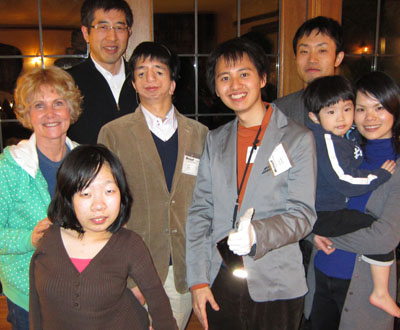
Join STEM Educators in a CoP
Members of the STEMed Community of Practice (CoP) include STEM K-12 and postsecondary educators and administrators interested in promoting the success of students with disabilities in STEM courses and careers. Participants:
- gain and share knowledge and help identify issues related to the under-representation of people with disabilities in STEM fields
- identify STEM events that students with disabilities might be invited
- discuss how to include accessibility topics in STEM curricula
- provide connections with STEM faculty and industry for internships
Send a request to join the STEMed CoP to doit@uw.edu.
AccessSTEM Capacity Building Institutes
A recent series of AccessSTEM Capacity Building Institutes (CBIs) took place at the University of Washington (UW), Seattle Central Community College (SCCC), and Bellevue College (BC). Three practitioner-focused CBIs were tailored to faculty, staff, and service providers, while three student-focused CBIs were tailored to postsecondary students with disabilities.
Practitioner-focused CBI's: Twenty-nine stakeholder participants and six AccessSTEM Team student members engaged during the practitioner-focused CBIs. Counseling and advising staff represented units such as engineering, chemistry, computer science, mathematics, and social science. Faculty participants teach in fields that include materials science engineering, electrical engineering, mechanical engineering, computer science, mathematics, and social science. Other stakeholders represent campus services such as career services, veteran services, and disability support services. Three associate deans from the UW College of Engineering were actively involved.
Students who engaged in the practitioner-focused CBI are listed below. They offered perspectives regarding inclusion in and preparation for postsecondary STEM programs and talked about accommodation issues and challenges.
- Patrick, UW bio-molecular design Ph.D. candidate
- Kate, UW computer science Ph.D. candidate
- Matthew, UW marine biology graduate student
- Justin, UW chemistry undergraduate
- Kayla, BC psychology undergraduate
- Anna, BC information technology undergraduate
CBI discussions focused on questions such as: What are some specific things we can do to recruit students with disabilities into STEM programs? What are specific ideas for recruiting undeclared freshman and sophomores into STEM? What are specific ideas for reaching out to high school students? What are some specific things we can do to support and encourage STEM students with disabilities?
Student-focused CBI's: More than twenty students met with project staff to talk about their experiences with K-12 education, transition to college, and college programs in STEM. Specifically, student discussions focused on the questions: Why do you think there is a smaller proportion of people with disabilities in STEM careers compared to the rest of the population? At what point in their academic career do you think students with disabilities are discouraged from pursuing STEM careers? What specific access issues for students with disabilities might there be in STEM courses and labs? In K-12 schools, what are some of the inhibitors (that discourage participation) for students with disabilities to pursue STEM? As students, what advice do you have for improving access to STEM education?
For proceedings from CBIs sponsored by AccessSTEM and other DO-IT projects, consult www.uw.edu/doit/cbi.
Accessible Science Kits
To encourage teachers to make science labs and activities accessible to all students, AccessSTEM staff created accessible science kits for AccessSTEM partner schools—BC, SCCC, UW, and Seattle Public Schools (SPS). To develop the kits, project staff researched the needs of students with various disabilities in science labs and then purchased products that ensure accommodations to these students. The kits bring awareness about the diversity of student abilities and learning styles in the classroom, promote universal design, and suggest ways to accommodate individual needs. The kits include the following items:
- magnetic stirrer
- talking weight scale
- butterfly life cycle manipulation kit
- non-slip mat
- large display talking calculator
- talking reading pen
- talking color teller
- talking tape measure
- audio/tactile liquid level indicators
- Braille geometric set
- dual countdown vibrating timer
- Braille labeler
For information on how to create your own accessible science kit and find sources for accessible products, visit www.washington.edu/doit/accessible-science-equipment. For more information on making accommodations in your science lab, visit www.washington.edu/doit/making-science-labs-accessible-students-disabilities.
AccessSTEM and Seattle Public Schools
SPS is the largest K-12 school system in Washington State, and serves more than 45,000 students. Leading the efforts of AccessSTEM, I work with SPS leaders to make STEM programs more welcoming and accessible to high school students with disabilities, expand the engagement of stakeholders, implement evidence-based practices to increase the number of students with disabilities transitioning to college, and expand an online resource to share research and promising practices.
Partnering with SPS Administrators, Counselors, Educators, and Parents. AccessSTEM staff attend meetings of the Career and College Advisory Committee, the Transition Planning Committee, and the career center and counseling staff and special education department heads. As a result of these engagements, stakeholders learn how to make classes more accessible, include students with disabilities in activities, and gain access to resources. AccessSTEM hosted SPS technology specialists at the UW's Access Technology Center where they received demonstrations and participated in assistive technology discussions. Parents received information from staff about scholarships, internships, events on college campuses, and provided resources on student self-determination and the transition to college.
Partnering with SPS Students. Nearly twenty students from SPS have joined the AccessSTEM Team to participate in electronic mentoring, learn more about opportunities and challenges in STEM, and hear about academic programs and work-based learning opportunities. Team members are invited to events at local college campuses and STEM businesses.
One such event is AccessSTEM Mentoring Day. This past fall, teachers and nearly 100 students with disabilities participated in this event. Students learned about the skills and education needed to be successful in STEM careers by visiting local companies such as Boeing, Seattle Children's [hospital], the Port of Seattle: SeaTac Airport, Seattle BioMed [research institute], and the UW's power plant. Students met with employees at the different organizations and had the opportunity to ask questions about various jobs and career paths.
Other campus activities that SPS students are invited to attend include
- Seattle community colleges' transition to college events
- UW Access Technology Lab tours
- UW College of Engineering's Discovery Days
- UW College of Engineering learning labs
- UW Math Day
Occasionally, the AccessSTEM project hosts online contests for SPS students. For example, in December 2010, AccessSTEM hosted its second STEM resume contest. Students received a series of online lessons about resumes and were encouraged to send their updated resume to project staff. Prizes were awarded to students with the best resumes.
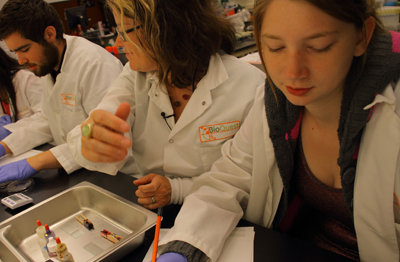
AccessSTEM Internships
AccessSTEM student participants have completed more than 200 challenging internships in recent years. Student experiences include collecting data from inside an active volcano, participating on a team that watched a space shuttle launch from a control room, working as a chemical engineer to explore photo-reproduction, exploring the mystery of an unhealthy wolf population by analyzing parasite DNA, counting salmon at Mud Mountain Dam, and creating working models of new rocket propulsion technology. Additionally, several students created new computer programs and reviewed websites for accessibility. In the last year, students have engaged in STEM internships that include:
- biology research intern at the UW's prestigious Kaeberlein Lab
- mechanical engineering intern at Tethers Unlimited
- astronomy research intern in the UW's Astronomy department
- library science research intern at the Renton Public Library
- bio-molecular structure intern at the UW's Daggett Research Group
A 2010 AccessSTEM Intern travelled to Costa Rica to complete a Hymenopteran observation study (yes, counting bees and wasps!). At one point, the group was following a GPS unit to the research site, when they came upon a 40 foot cliff. It can truly be said that the life of an intern is not dull! Students who want to learn about STEM internship opportunities can email Scott Bellman at swb3@uw.edu.
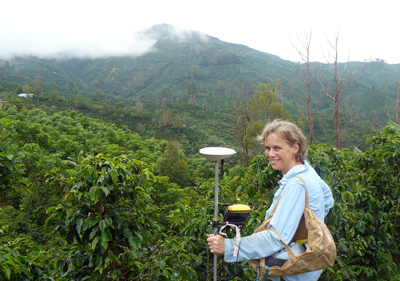
STEM for Students at Transition Event
This winter more than sixty-five Seattle high school students attended a transition to college event at North Seattle Community College (NSCC). During the event, students learned how to navigate disability services and received tips about how to make a successful transition from high school to college. Included were two hands-on STEM labs—nanotechnology and biochemistry. The students were excited to work in a college lab and learn from a college instructor.
Frank Deering led the biochemistry lab. Participants viewed pond water and coral under microscopes, used an anti-static gun, and saw skeletons, a model of a human heart, and a simulated pound of fat. The highlight of the lab was the Pennies to Gold experiment. In this activity, students coated pennies with zinc and, using a flame, changed the color of the pennies from copper to gold. The students learned that under exposure to the flame, the zinc coating reacted with the copper penny core and formed a golden-colored brass…pretty cool stuff!
Maureen Devery led the nanotechnology lab. Participants learned how special high-resolution microscopes, like the Atomic Force Microscope, determine what a sample looks like by measuring the forces given off by the sample. Students also saw products that use nanotechnology, including a shirt with a coating of nanoparticles, which makes it repel water and ferrofluid (a liquid magnet).
The high school students were inspired by the hands-on experiments. Their participation encouraged some to pursue STEM fields.
AccessSTEM Team Member Profile: Anna Golden
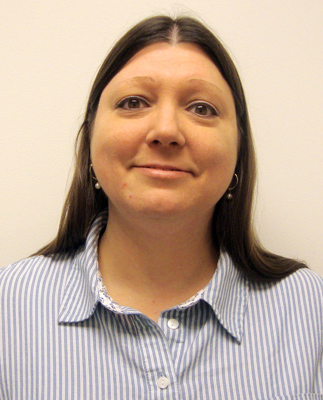
Hi! I'm Anna Marie. I graduated from Bellevue College in August with an Information Systems Associate in Arts degree and a Certificate in .NET Programming. I first became involved with DO-IT and AccessSTEM when I was interviewed for the Access to Advancement radio series about women with disabilities involved in and preparing for STEM careers.
Since then, I've had the opportunity to do a number of things including participating in panels to represent students with disabilities and attending networking events with other DO-IT team members. I've also participated in a number of career exploration activities including job shadows and informational interviews. I even went to Boston for the Career Opportunities for Students with Disabilities Full Access Student Summit, where I learned a lot about networking, job seeking, and even a little about dining etiquette.
I've been learning how to build websites since graduation. In September, I participated in the AccessSTEM Web Accessibility Training and Internship which allowed me to learn more about web development and accessibility issues. The experience also led me to my current web development and accessibility internship. I'm learning a lot and stepping more and more outside of my comfort zone each day.
In fact, each and every one of these activities involved stepping out of my comfort zone. There is an old saying that goes, "If you keep doing what you've always done, you're going to keep getting what you've always gotten." That means it is time to try something new. Sure, sometimes it doesn't turn out as expected, but lots of times it turns out even better.
AccessSTEM Team Member Profile: Kayla Brown
Hi! My name is Kayla and I am an AccessSTEM Team member. I will be graduating this spring from BC, and I plan on transferring to the UW to pursue a degree in psychology and disability studies. I first participated in AccessSTEM after I graduated from high school. I was looking for an internship so I could build a more impressive resume, and AccessSTEM helped me find one. They even paid me to do my internship, for which I was grateful. My first internship was at the Kindering Center. I have completed a few more internships since then. In addition, AccessSTEM is currently providing financial assistance to pay for my tutor.
I am also on the A-Team, which is a group of college students at AccessSTEM partner schools who help design project activities that promote AccessSTEM to students with disabilities and support those majoring in STEM fields. One of our recent activities provided AccessSTEM Team members with an opportunity to complete accessibility reviews of local informal science venues for the opportunity to earn money. We also ran a resume contest, with more than forty submissions. There were prizes for the best resumes, but the most important outcome was that lots of students, with help from AccessSTEM staff, improved their resumes. You can read more about the contest on page eight.
My work through AccessSTEM has motivated me to start an AccessSTEM student group at BC. The goal of the group is to provide a way for AccessSTEM Team members to stay in contact by meeting on a monthly basis. Activities for the meet-ups include mock interviews, networking gatherings (with pizza!), movie nights, STEM workshops, and much more. If you are a BC student with a disability who would be interested in joining the AccessSTEM club, please email me at kayladb@uw.edu.
AccessSTEM Provides WAT?
WAT? That's right. WAT.
AccessSTEM has held Web Accessibility Trainings (WAT) for high school and college students with disabilities since 2009. One goal of AccessSTEM is to help students with disabilities succeed in STEM courses and reach critical junctures on paths toward college studies and careers in STEM fields. WATs help students learn the basics of web design, with an emphasis on how to create web pages that are accessible to all users, including those who are unable to see, use a mouse, perceive color, and use a smart phone or other mobile device. Developing skills in accessible web design could be the start of a career in web accessibility. Several web accessibility positions have been advertised in recent months, including positions at colleges and universities; federal, state, and local government agencies; and consulting companies. Leading technology companies, including Google, Microsoft, Adobe, and even Facebook, have also announced positions for accessibility engineers.
WATs include training on writing accessible HTML and provide a basic introduction to cascading style sheets (CSS) and Javascript. These three ingredients are used together to create most modern web pages. WATs include a variety of hands-on activities. Students conduct accessibility evaluations of real-world websites, design their own websites, and caption STEM-related YouTube videos. The technical aspects of the trainings are combined with practical training related to employment and self-advocacy. Participation in the trainings also helps connect students with educational and work-related experiences, including internships.
Our WATs are typically three- or five-day trainings targeted at specific groups. The first was taught in the summer of 2009, and included ten students from various colleges and universities. One participant who was previously undecided in his career path, but was motivated by his WAT experience, decided to spend a year at a community college to complete the prerequisites to pursue a bachelor's degree in computer science. After the workshop, he found a summer internship at the UW Seattle.
In 2010, inspired by the success of the first WAT, AccessSTEM conducted two more WATs, one three-day training in August for a pair of AccessSTEM team members attending high school in SPS, and a larger five-day training for AccessSTEM Team members at BC. Thirty students participated in the BC WAT, including Anna, who is now working as an intern rebuilding the website of the Seattle Deaf-Blind Service Center to make it more accessible and improve its overall design. You can read more about Anna on page six.
Some WAT students have pursued additional training in web- and computer-related areas, and have reported bringing accessibility awareness to their instructors and peers. Our objective in offering these trainings is for students to acquire technical and employable skills, but also to raise awareness about web accessibility among future designers and engineers of the world. It's a small start, but if each student educates one other person, who educates yet another person, and so on, we'll be on our way to a more accessible future.
For additional information about future WATs, contact Terrill Thompson at tft@uw.edu or stay tuned to www.uw.edu/doit/Stem/stem_events.html.
Resume Contest Winners
Throughout the year, AccessSTEM Team members hear about scholarships, internships, and other work-based learning opportunities through an online discussion list. This December, one of those opportunities was a resume contest. We received more than forty resumes. The grand prize winner was Nicco from Seattle Public School (SPS) who won the drawing for $150 stipend to use towards his education. In addition, the eight best resumes were selected for a $50 education stipend—winners were Alex, University of Washington; Alysa, Bellevue College; Carolyn, Bellevue College; Kathryn, Olin College; Lewis, University of South Carolina; Liliana, University of Washington; Scott, University of Washington; and William, SPS. Runners-up were Chad, University of Washington; Ema, UW; Mohamed, Bellevue College; Russell-Albert, SPS.
AccessSTEM Team members can send their resumes to staff for review or assistance any time of the year, by emailing doit@uw.edu. Campus career centers are also a great resource for student resume writing. For more information on career readiness, read Preparing for a Career: An Online Tutorial at www.washington.edu/doit/preparing-career-online-tutorial or visit the Student Lounge at www.washington.edu/doit/programs/accesscollege/student-lounge/overview.
Resume Writing Tips
We often get questions about what makes a good resume, here are a few tips to make your resume stand out.
- Keep a master resume that contains every work related experience with contact information for all of your supervisors—it makes writing resumes, cover letters, and filling out job applications a breeze.
- Tailor your cover letter and resume for each job you apply for. Match your experience and skills to the job qualifications required.
- Omit older experiences or those that aren't relevant to the new opportunity.
- Prioritize the content of your resume. Make sure that the most important information is near the top of the page.
- Mirror the language found in the job post to language used in your cover letter and resume. This makes it easier for a higher manager to see that you're a good fit for their position.
- Sell the benefits of your skills. List your accomplishments, not your job duties.
- Quantify your accomplishments. Instead of "Typed letters and correspondence," write "Achieved top production volume by maintaining high degree of accuracy with typing speed of 80 wpm."
- Proofread your cover letter and resume, and ask others to proofread as well to be sure it is free of typos and is well formatted.
The Thread: College Accommodations
I wanted to share with you a discussion that took place in our online discussion forum so that you can get the flavor of the many rich conversations the AccessSTEM community has online. Some forum posts are edited for clarity and brevity.
Many of you are in college or have graduated from college. It would be informative to others if each of you would share the specific accommodations you have received in college classes.
Student Team Member: At San Jose State University, I had the following accommodations: a special center with computers running the assistive technology I needed where I could take my exams; extra time and assistance for taking tests; and a disability center that trained me to use assistive technology, converted my textbooks and exams to an accessible format, and staff that helped me talk to professors about accommodations.
Ambassador: At UW Seattle, my accommodations included alternate format for texts (usually large print or electronic), large print tests and extended test time, extensions on projects/papers if needed, adaptive equipment in class for viewing lectures and notes, and a single occupancy dorm room (one person in a room made for two people at regular rate).
Ambassador: I received a printed copy of the presentation slides (since most of my classes use them as notes) and a testing space option with extended time on tests.
Student Team Member: The accommodations I received were: books on tape, a note taker, and extra test-taking time.
Ambassador: Right now my accommodations are at a minimum since my classes are online. But I do ask for transcripts of the videos that I have to watch. When I attend classes on campus, I use my laptop to record the lectures while I type my notes.
Student Team Member: For my diagnosis of Asperger's syndrome/ high-functioning autism, my accommodations varied depending on the subject-matter of individual courses. For instance in mathematics courses where I frequently struggle, I felt I needed more accommodations that would help me succeed than a course in geology. Here is an aggregate list of accommodations I have received: extended time to write exams (usually one-and-a-half times the allotted time); for a public speaking course, I requested and received accommodation that my speaking not be graded based on the my speaking patterns (i.e., monotone, somewhat halting inflection), which for many autistics, including me, is a notable characteristic; and for courses that have a field trip component, (common in geoscience courses) I requested that my instructor give me advance notice as to the "four Ws" what, when, where, and why. My brain needs extra time to process what I am about to do and where the trip is.
Ambassador: I received books from Recording for the Blind and Dyslexic (RFB&D) and the disability resources center at Portland State. I had in-class assistants describe what the instructor was drawing on the board for math and statistics classes. I used a standard laptop for note taking. It had Microsoft Excel and a calculator so I could perform calculations during math and science classes. In addition, I installed Victor Reader Soft on my laptop so I could read books from RFB&D.
Ambassador: I have Asperger's syndrome. Normally, I get double the time on tests, which ranges from two-to-four hours extra and testing in a private room with a proctor at request. I have a digital voice recorder to record lectures because it is hard to take notes and listen to professors. I have a note taker for classes, which helps me make study guides for tests, or I get the presentation slides from the professor for notes. I get instructions repeated for group assignments, and professors can pick who I work with. I have medical and health warnings for my medications that cause drowsiness, so I am not penalized for sick days.
Ambassador: I've had a number of accommodations over the past few years (I'm deaf), which all boil down to accessibility of audio information. Here's what has been provided, depending on the situation: ASL interpreters (especially good for labs); live transcribers; and remote captioning, interpreting, and transcribing.
Student Team Member: My college accommodation involved receiving course material in an electronic format, especially in my computer classes. Receiving class material and communication with professors was done via email. If the disability resource center (DRC) created an electronic document for me, I accessed it with a flash drive. For lab classes, the DRC technician would sit with the professor and me while we figured out how best for me to participate and make adjustments to the lab equipment. It was fascinating to the class whenever the technician was showing my professor how accessible technology works, the lab was almost like a show and tell. Also, I was able to use my own laptop in class, which made it possible to take my exams in class as well.
Student Team Member: I have orthopedic issues with my hands, wrists, shoulders, and neck. My accommodations have included extra time on exams, digitally recorded lectures and meetings, note takers, using a laptop during class, and using voice recognition software on my laptop. Most of my classes are in advanced math and biological science so the professors don't have the time to draw out complex diagrams during our lectures. It is more expedient to have the notes in a pre-made, electronic format. Since most of my cohort knows that I have a digital recorder, I have become the go to person for my classmates when they miss a lecture. My voice recorder's software saves to either a .wav or MP3 format and I can just transfer the lectures to them via a flash drive or an electronic drop box. Additionally, since I am a graduate student, I have an assigned office and designated desk space. I was granted an office in a more centrally located building to help me avoid carrying a full backpack between campus multiple times a day.
Student Team Member: At UW Seattle (biology major), my accommodations include a note taker, time-and-one-half on exams, which are proctored by the department or at the disability office; early or priority class registration; and a reduced credit load. I just learned about a special study room for students with disabilities at the UW Seattle's Suzzallo library. This is great since the library can get crowded and noisy.
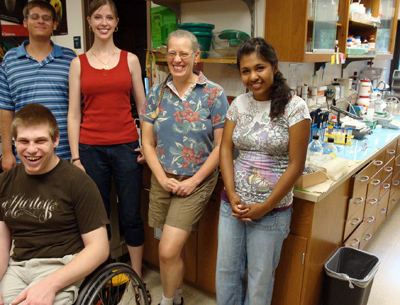
AccessSTEM Resources
Website—www.washington.edu/doit/programs/accessstem/overview
Access AccessSTEM project information, resources, and materials.
Knowledge Base—www.washington.edu/doit/programs/accessstem/knowledge-base
Consult Q&As, case studies, and promising practices regarding strategies for making STEM curricula, classes, labs, and careers accessible for people with disabilities, including the application of universal design principles.
Videos—www.washington.edu/doit/videos/
Open-captioned and audio-described videos are available freely online for streaming or download, and DVDs are also available for purchase.
Publications—www.washington.edu/doit/resources
Publications are available online or in print format for free or at low cost.
